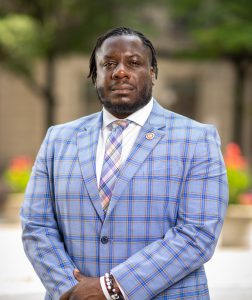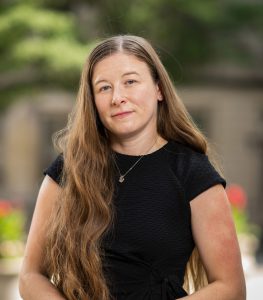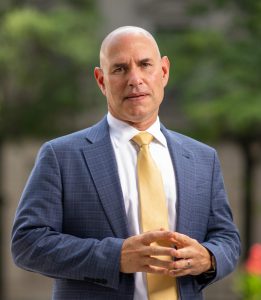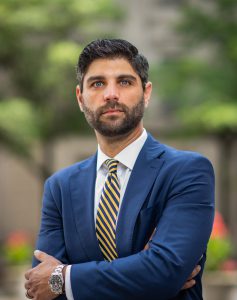By Adam Stone
In January 2020, a Prince George’s County police officer shot and killed William Green. At the time, Green’s hands were cuffed behind his back, and he was sitting in the front seat of a parked police cruiser.

As part of the legal team representing Green’s family, Malcolm Ruff, J.D. ’12, helped win a $20 million settlement for the victim’s mother and two adult children. Ruff says his UBalt Law education “was a foundation that really set me on the path towards fighting for justice and standing in the gap for folks who had been violated by the government.”
He’s one of several UBalt Law alumni who are focused on police brutality and detention-center abuse cases.
Kristen Mack, J.D. ’17, tackles such cases as an associate attorney at Hansel Law, PC. The firm represented Daquan Wallace, a 19-year-old who was beaten and left paraplegic while in pre-trial detention.

As Mack and others have learned, it’s incredibly difficult to hold police and prison officials accountable for mistakes and abuses. “There are a lot of immunities and laws that are designed to protect the state from liability,” she says. That includes various caps on damages.
“You need someone that is extremely knowledgeable of this subject matter so that you can get around these caps, because — let’s be serious — the only way that we’re going to change things is if we make them pay enough money,” says Mack.
Since entering the field, Mack has worked hard to master the nuances. “Every case is very different, and the details matter tremendously in what we do,” she says. “I learn the most when I’m having to oppose motions — motions for summary judgment in particular, because it forces me to sit down and go head-to-head with these issues.”

Larry Greenberg, J.D. ’94, says a detailed understanding of the law helps him to represent those who are “consistently being targeted and then abused by the system.”
The wheels of such justice turn slow: Greenberg spent close to five years trying to win compensation for the family of a man who was run over and killed by a police officer who simply wasn’t paying attention to the road.
“There are immunities that apply. If an officer is driving his or her vehicle and they’re in the course of their employment, one immunity applies. If they’re driving and they’re in the course of duty, but they’re not in an emergency situation, another immunity applies,” he says.
In cases like these, “all of the hoops you have to jump through to potentially get justice exist to benefit the state, not the injured,” says Greenberg. With the odds stacked in favor of law enforcement, “you have to know how to avoid the pitfalls and land mines that go with civil rights cases.”
Lawyers in this field have to keep current. “I always read the new cases that come out, and I don’t limit it just to Maryland. I’m looking at federal courts, I’m looking at the Supreme Court,” he says. At the same time, he works to help shape the legal landscape in favor of plaintiffs. “We’re in Annapolis frequently,” Greenberg says, “working with the legislators to try to make rules that help the citizens, not just the state.”
Such efforts helped lead to adoption of the Maryland Police Accountability Act, a 2021 law requiring all counties to create three police oversight boards: a Police Accountability Board, an Administrative Charging Committee, and a Trial Board.
“I believe the police play an important part of our system. However, I believe those officers should be well trained,” he says. “Bad hiring, bad training, failure to discipline — all of these things come about, and that’s why people get hurt.”
Shifting landscape
Like others, Greenberg has seen public opinion start to shift in the wake of the George Floyd murder and Black Lives Matter protests. But he worries that the relatively recent uptick in awareness will prove temporary. “As a society, we are reactive,” he says. “It gets into our discussion for a news cycle … and then it’s gone. The news cycle comes and goes.”

Allen Honick, J.D. ’16, says that while increased public awareness has helped, deep institutional changes are needed, and those take time. “There has been progress, one foot in front of the other, but it is very slow,” he says.
Many of Honick’s cases involve matters like wrongful arrest, wrongful incarceration, prison guard misconduct, and related civil right claims. How to win such cases? Stubbornness helps a lot.
“You have to be resolved that you’re not going to get dissuaded by the procedural requirements, the onerous preconditions to suit, the obfuscation and the stonewalling,” Honick says. “You just have to resolve ahead of time that you’re going to put your head down and see this thing through.”
On the plus side, says Ruff, everyone these days has a camera — not just policy body cams, but the cellphones that take every event immediately to social media.
“That is changing the paradigm of how people view accountability for law enforcement,” he says. “For years, officers were able to create what we call silent narratives: They can spin a situation, because they get the benefit of the doubt. That was being abused to a very high degree.”
In the era of social media, that’s changing. “We recently handled a matter against the Baltimore County Police Department, where our client was accused of assaulting an officer and resisting arrest,” Ruff says. The officer claimed justification for violence, “and the video just simply did not show what he said.”
Real-time documentation by itself won’t fix the accountability gap. But it’s one step toward rectifying a system that these lawyers say has for too long been tilted in favor of institutions, rather than individuals.
Adam Stone is a writer based in Annapolis.
Photos by Maximilian Franz.
